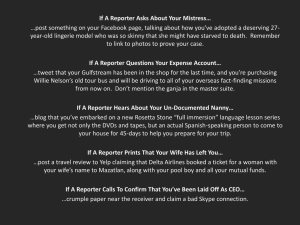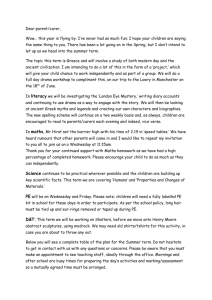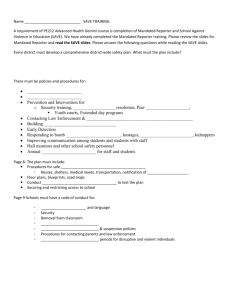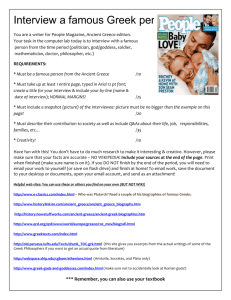BtN: Episode 13 Transcript 22/5/12 On this week`s Behind the News
advertisement
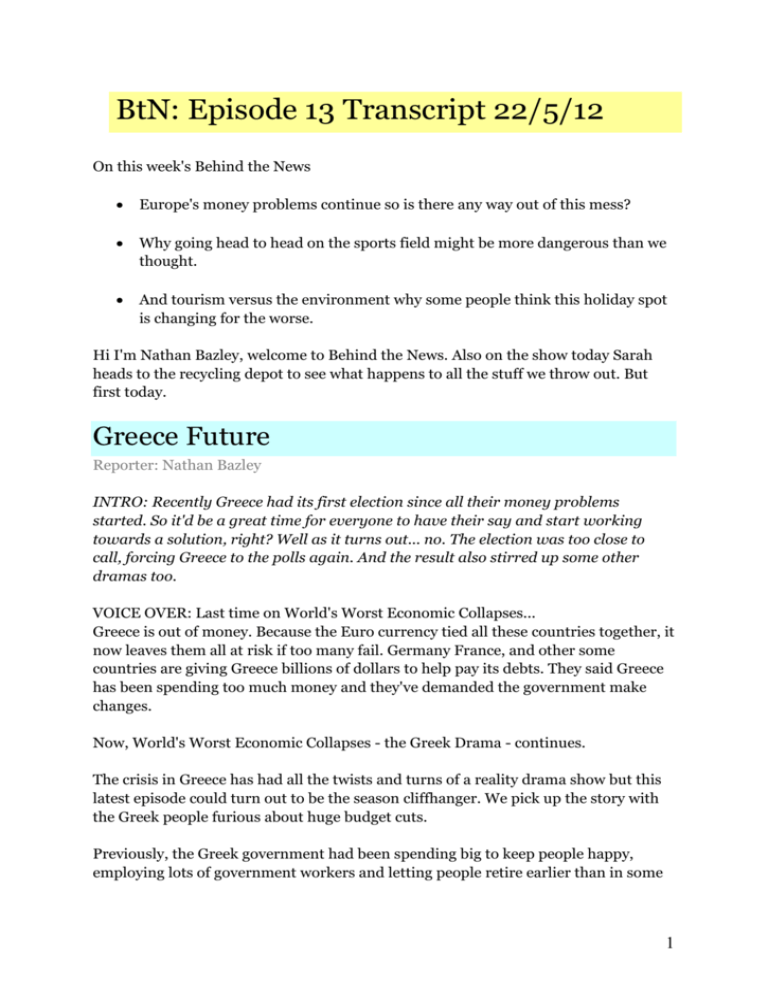
BtN: Episode 13 Transcript 22/5/12 On this week's Behind the News Europe's money problems continue so is there any way out of this mess? Why going head to head on the sports field might be more dangerous than we thought. And tourism versus the environment why some people think this holiday spot is changing for the worse. Hi I'm Nathan Bazley, welcome to Behind the News. Also on the show today Sarah heads to the recycling depot to see what happens to all the stuff we throw out. But first today. Greece Future Reporter: Nathan Bazley INTRO: Recently Greece had its first election since all their money problems started. So it'd be a great time for everyone to have their say and start working towards a solution, right? Well as it turns out... no. The election was too close to call, forcing Greece to the polls again. And the result also stirred up some other dramas too. VOICE OVER: Last time on World's Worst Economic Collapses... Greece is out of money. Because the Euro currency tied all these countries together, it now leaves them all at risk if too many fail. Germany France, and other some countries are giving Greece billions of dollars to help pay its debts. They said Greece has been spending too much money and they've demanded the government make changes. Now, World's Worst Economic Collapses - the Greek Drama - continues. The crisis in Greece has had all the twists and turns of a reality drama show but this latest episode could turn out to be the season cliffhanger. We pick up the story with the Greek people furious about huge budget cuts. Previously, the Greek government had been spending big to keep people happy, employing lots of government workers and letting people retire earlier than in some 1 other countries. But the money they earned from tax just didn't cover it. So they ended up in huge debt. To help, some countries around them decided to pitch in and give them huge amounts of cash on the proviso that Greece agreed to cut spending drastically but as you can see, it didn't go down well. The spending cuts made the Greek people really angry and that anger was focused on the government. So when election time hit, as it did recently, this is the kinda thing you could have expected to see on TV from the parties campaigning against them. POLITICAL AD VOICE: How do you feel about not having a job? About paying more taxes? About Greece grinding to a halt? Not a fan? Well vote for us! FAST VOICE: This is a pretend political ad no real political parties in greece had ads like this; theirs were a bit more subtle. The election was so close it'll have to be re-run. But one thing was clear from the vote. Greek voters are turning their support away from the government and towards new parties with one clear idea. And what is this new idea? Well basically they want to do the exact opposite of what other countries like Germany and France have been telling them to do. They want to keep spending. This left Greece's neighbours fuming because Greece had agreed to tighten its belt and pay them back all the money they were loaned. And what happens to Greece affects all the countries that share the same currency - the Euro. So the rest of Europe has a tough call to make. On one hand they could just keep giving Greece cash even though they wont agree to harsh cuts. It might keep them going for a while but in the end may not even save the struggling country. On the other hand, the only other option is a pretty drastic one. Essentially they'd have to cut Greece off! It'd mean forcing Greece to stop using the currency they all share - the Euro - and take up their old currency again, the Drachma. But that could leave both sides not looking too healthy. As opposed to the earlier option which could also leave both sides not looking too healthy. See? This one's going to be a cliffhanger. VOICE OVER: This has been World's Worst Economic Collapses. Tune in for our next series, World's Hardest Financial Recoveries... hopefully coming soon! Presenter: OK, let's see what else is making the news this week. Here's Tash with the Wire. 2 The Wire 50 of the world's most powerful leaders have gathered in the US city of Chicago to talk about ending the war in Afghanistan. U-S President Barack Obama, and our Prime Minister, Julia Gillard were just some of the big wigs making an appearance. And their task during the meetings is to plan exactly how and when outside armed forces will leave Afghanistan and hand control over to local security. The talks are a special summit for countries who have signed a military alliance together called NATO. ***** Thousands have turned their eyes to the sky to catch a glimpse of an annular solar eclipse! That's when the sun and moon are exactly in line blocking off much of the sun's light. That leaves this amazing view something many call a "ring of fire". ***** And the Wiggles are being shaken up! Three members have decided to hang up their skivvies at the end of the year. Jeff, Murray and Greg will be replaced, but Anthony the blue wiggle will stay on. And the little kids group will get its first female member, Emma, who will wear the yellow skivvy. The Wiggles released their first album more than 20 years ago, and they're now a worldwide hit. Gene Patent Reporter: Sarah Larsen INTRO: In the past few decades scientists have made some pretty amazing discoveries about people's genes. They're like the body's recipe book; they determine what we look like and how our bodies work. They've even linked genes to certain diseases like types of cancer and that's a big step towards finding cures. Except, there's some debate going on about who gets to work on particular genes. Here's Sarah to explain. SARAH LARSEN, REPORTER: Imagine you were a brilliant scientist who discovered something amazing, like, an instant hair growth potion! You could make a fortune but first you have to make sure no-one else can copy your idea. You have to go and get something called a patent. It's a document which makes you the legal owner of your invention so no-one can copy it for 20 years. 3 You can patent all sorts of things from electronic gadgets to Star Wars toys. Michael Jackson even patented his special gravity defying shoes and some companies have put patents on genes. Not these jeans, these. They're like our body's recipe book; codes that determine everything about us. There are genes which make your hair blonde, genes which make your eyes brown. There are even genes which make you more likely to get certain diseases. And as scientists find out more about just what each gene does, some are patenting what they find. KID: Hang on! I thought you could only patent stuff you invented. How can you patent something that's a part of me? Well in nature you can't really study or use a gene on its own. You have to make a synthetic copy and that counts as an invention, as long as you can find a use for it. But it's controversial. In Australia a fight's been going on over genes which can cause breast cancer and ovarian cancer. Testing for the genes can save lives. But a few years ago Aussie scientists were told they weren't allowed to do the tests because the rights to those genes were owned by a company. In the end that company changed its mind and let the tests continue but it got many researchers worried about how patents can affect science. The Australian government changed the law so that scientists can use patented inventions for research as long as they're not going to make a profit. But some say when it comes to genes patents shouldn't be allowed at all. GRAEME SUTHERS, ROYAL COLLEGE OF PATHOLOGISTS (2009): It is absolute nonsense to consider that the gene could be patented. It's a naturally occurring substance. It would make as much sense to patent a gene as it does to patent the moon. IAN OLVER, CEO, CANCER COUNCIL OF AUSTRALIA: Look, if you can just get a patent for just discovering the presence of a gene, then you really block everyone else from being able to work on that gene. And so we are saying that that's not what patent law should be. It should be about an inventive step, then you can have the patent. Organisations like the Cancer Council say scientists need access to all the information they can get. So they can make new discoveries, share information, and ultimately, find cures. They're supporting a new law which this politician is trying to pass, which would ban all gene patents in Australia. But then there's the other side of the argument. 4 Private companies spend a lot of money on genetic research, knowing that they can make a profit from their discoveries. If there's not as much profit being made there might not be as much research done. Some reckon the government needs to support any company that's looking for cures. Plus, companies only get 20 years to make money from their patent and some say that's not very long by the time they've finished testing their treatments. Hopefully there's a solution that keeps medical research growing. Presenter: OK, on the subject of patents and inventions, let's have a quiz. Quiz 1 The question is: Which of the following items was invented in Australia? Fridge Ute Note Pad Answer: All three Other things invented here include army tanks, ultrasound, the movie clapper board and the dual flush toilet. And it wouldn't surprise you to learn that we also invented Aussie rules football and that's where we're going next. Head Injuries Reporter: Alfie Tieu INTRO: New research has found that when players take a big knock to the head the effects can be much worse than previously thought. And it's led to some people saying stricter rules are needed to keep players safe. Here's Alfie. ALFIE TIEU, REPORTER: In school sport, like in the professional game, sometimes you have to go hard to win. BOY 1: You'll always get little bruises but that's just part of the deal I guess. BOY 2: Football is a team game, and a lot of the time you hear people say, "Put your body on the line for your teammates." 5 It's well known that injuries and sport go together. And as we see on TV, when the big players go head to head the injuries can sometimes be really serious. And it's not just the professional game where people face big hits. Zach had to be taken to hospital during one of his Rugby League matches. ZACH WALSH: I was really dizzy. I remember in the car going like this, I was like (head lolls and makes face) I just couldn't keep my mouth, like, shut, pretty much. I just had this face about me, that's what my mate told me, it was pretty weird. All these players have suffered from concussion. The brain actually bounces against your skull causing bruising. And a concussion can make small tears in the nerves that can stop the messages flowing around the brain. That can make people confused, give them blurred vision, headaches or even make them unconscious. But some new research could be about to change the way we think about it. Scientists in America have found that the true damage from concussion might not be fully known until many years later. These guys studied the brains of American footballers, and found that many shared a brain condition. It's called chronic traumatic encephalopathy, or CTE. It leads to memory loss, headaches, tiredness and other problems, and sometimes the symptoms don't even show for decades. DR ANN MCKEE, BOSTON UNIVERSITY: The longer you survive with this disease the worse it's going to get. ALFIE TIEU, REPORTER: And that means some people are calling for concussion to be taken more seriously. JEFFREY ROSENFELD, NEUROSEURGEON, ALFRED HOSPITAL: I personally would say three significant concussions, three strikes and you're out. That's what I would say. The football codes have already made some changes to make the sports safer, like checking players' brains before the start of each season. And some dangerous tackles have been banned. Then there are new guidelines that recommend that a player shouldn't come back onto the field if they've been concussed. There's also been an argument that players should wear head gear during games, but some people think it gives players a false sense of safety and makes them play even rougher. Back at the school leagues, teachers and coaches make safety their first priority. 6 BRYAN BEINKE, SCHOOL DIRECTOR OF FOOTBALL: A lot of the boys they get very keen, they wanna come back straight away, but we force them to take the appropriate time off. BOY 2: It's definitely not worth risking your own body 'cause it can take you out of the game, you might not be able to play sport for the rest of your life. In a game of thrills and spills, there's always going to be some risk involved. But the more we know about things like concussion, the better chance we'll have of keeping our players safe. Presenter: OK in that story we mention players wearing helmets to protect their heads. That's our poll this week. Online Poll The question is: Should kids be made to wear protective head gear when playing contact sports? To vote, just head to our website. Last week we asked should animals be banned from the circus. 52 per cent thought they should. 48 per cent thought they shouldn't. Close one! Thanks for voting. Paradise Lost Reporter: Nathan Bazley INTRO: To around 800 thousand Aussies every year, Bali is a spectacular tropical getaway. But to some locals it's changed so much over the past thirty years that they barely recognise it. Away from the eyes of tourists the Balinese are having huge problems with rubbish. And big resorts are popping up everywhere. It's got many locals wondering if tourism has gone too far. NATHAN BAZLEY, REPORTER: Life doesn't get much better than this. But for a pro surfer, this is heaven! MEGA SEMADHI: It's like dancing to the moon, yeah. 7 Mega is a Balinese surf champion and it’s here that he learnt his skills on his home break, Uluwatu, Bali. But things look a lot different here now than they used to when he was a boy. Back in the 70's, this place was a hidden paradise. Some of the first surfers travelled here by dirt road and discovered great waves and crystal clear water. Over the years, its popularity exploded. And now, that popularity is starting to take its toll. MIKE O'LEARY: Everyone sees a great environment of Uluwatu out in the surf but they don't see the accumulation of the cooking oil, sewerage and other liquid waste. Mike and a few other surfers have raised money to test the water out here. And the results haven't been too comforting. They've found human waste and other nasty things seeping into the surf. Right across Bali, the tourist influx is stretching the island to breaking point. Two and a half million fly here each year. To cater for all those tourists, five star resorts have popped up everywhere. And each guest that uses them, flushes away 3 times the amount of water per day than a whole Balinese family would use. And all those people means a lot of rubbish too. It's dumped only a few kilometres away from the strip where most tourists are living it up. It floats down the river and ends up on the once world famous beaches. This area is now anything but the tropical paradise it used to be. All of this development and pollution has left some young Balinese people feeling like their home has been sold out in exchange for tourism dollars. Jering is part of a new generation of Balinese people who want to say no to development and no to the bad things done to the environment. And he's got a pretty loud voice, as the lead singer of one of the country's biggest rock bands called Superman is Dead. JERING ASTIKA: It takes a lot of our dignity and pride and somehow we feel like this is not our home you know? This is another country. Tourism can be a tricky subject, because many people that live here rely on tourism dollars to survive. Lots of Balinese people are employed by the tourism industry, making it an important part of the economy. But with tourism anywhere in the world it's about striking a balance between money and the environment. Presenter: That's an interesting issue. 8 Let's have a quiz about it. Quiz 2 The question is: What is the capital of Indonesia? Jakarta Borneo Bali Answer: Jakarta Ten million people live in the city making it one of the most crowded cities in the world. OK, let's have a look at some of the big sports stories of the week. Tash has the score. The Score In Soccer, the final of the European Champions league was decided in a dramatic penalty shootout! Chelsea were taking on German club Bayern Munich and at the end of play the scores were 1-all. That forced the game into a shootout to decide the champion where Chelsea's Didier Drogba clinched it for the blues! ***** And the world of Moto GP racing has been rocked by some big news. Casey Stoner, an Aussie with 35 race wins and two world championships under his belt is calling it quits! The 26-year-old says he'll finish up at the end of this season. He says he's not enjoying the sport anymore, and wants to tackle other challenges. “This sport has changed a lot and it's changed to the point that I'm not enjoying it. I don't have the passion for it and so at this time it’s better if I retire now.” Meanwhile after this weekend's racing Stoner has dropped from first to second place on the championship leader board. He came third in a wet French Moto GP. Spain's Jorge Lorenzo won the race and takes the overall lead. 9 Recycling Reporter: Sarah Larsen INTRO: Did you know that Australia is the second biggest producer of rubbish in the world? It's not a great record to have! Every year each Australian throws out almost 700 kilos of stuff and a lot of that ends up in landfill where it can take hundreds of years to break down. But it doesn't have to be that way if you change the way you think about it. Here's Sarah. SARAH LARSEN, REPORTER: Poor old rubbish, it never gets any attention. Once it's done holding your drink or keeping your sandwich dry it just gets thrown away and ignored. But the stuff that ends up in our bins has a story to tell. And here at Our Lady of Hope the students are giving it the attention it deserves The guys from KESAB which is part of Keep Australia Beautiful are here to show the kids just what's gone into their school's bins in a day. KID: we're putting it in different groups that it's meant to go in. The rubbish is sorted out into different categories... like zip-lock bags, paper, drink containers, scraps, and food that hasn't even been tasted! Is there anything you've found there that's surprised you? KIDS: Yeah, a whole donut. oh yum , Is it kind of gross? KIDS: Yeah, but fun. Bin audits like these are designed to help schools reduce the amount of stuff they're sending to landfill. Every year, Australians send so much rubbish to places like this that if it were spread out, it'd cover all of Victoria! And that's a situation many want to change. Aussies are getting better at paying attention to what they throw out. In the old days everything would go into one bin like this and off to landfill. Now you've got a bin for green waste, food scraps and stuff from the garden which gets turned into compost and a bin for recyclables; things like rigid plastic containers, glass, cardboard and paper, and some metals. The recyclables come here. That's a big pile of rubbish. 10 THAO: Sorry, it's not a pile of rubbish it's actually called recyclable material. Get that right. That's right, here rubbish is a dirty word, because most of this stuff will be bundled up, sold and reused. Something like a cardboard box here, what could that be in a second life? THAO: Something like toilet paper, or even another box When it arrives, the rubbish, sorry, recyclable material is fed into some clever machines which separate it by size and type. Then workers sort out the different materials. They have to wear special gloves because some pretty nasty things can end up here. REPORTER: Is that a dirty nappy? THAO: Yes, lots of nappies come through. For some reason people think nappies are recyclable but they're not. Thao says their job is made harder when people put the wrong things into the recycling like foam, plastic wrappers, clothes, even toys! REPORTER: Now he doesn't belong there. THAO: yeah definitely kids toys and stuff. Like I said they are recyclable at other places but definitely not here. Stuff like this has to be sent to landfill and that costs money so, Thao says it's important to pay attention to what you out in each bin. Back at Our Lady of Hope the kids learned a lot from their bins. KID: That we actually do have a lot of rubbish so we have to work on trying to keep it down. How can you keep it down? KID: Bring containers with your lunch in there and you can just take your container home and wash it so like reusable stuff. The guys from KESAB showed them how to reduce, re-use and recycle. And Jo reckons with a bit of work there'll be a lot less waste. 11 JO, KESAB: Some school that' we've done audits at have reduced the amount they're sending to landfill by up to 88 percent. All it takes is a bit of thought, a bit of effort, and just a little more love for the stuff we put in the bin. Closer And that's it for the show. You can jump onto our website if you want to get more info on any of the stories. You can send us your comments and don't forget to vote in this week's poll. I'll see you next time. 12
